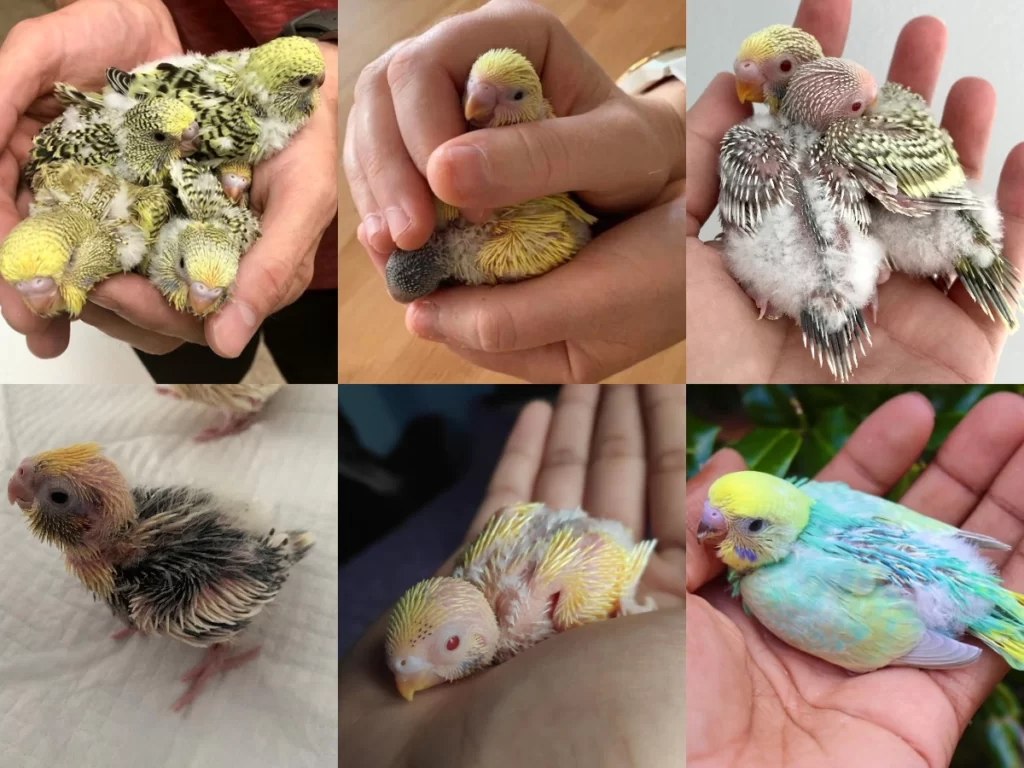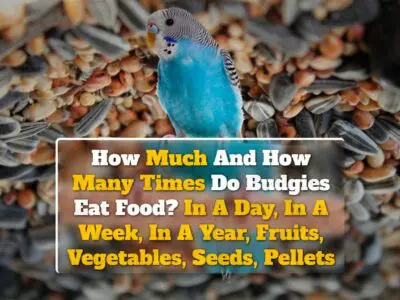Baby budgies that are 2-3 weeks old typically consume a diet of hand-rearing formula, provided every 3-4 hours.
They can also start to be introduced to homemade food recipes containing ingredients like cornmeal, ground oats, chia seeds, beetroot pulp, boiled eggs, and coconut oil for proper growth and nutrition.
If you’re a budgie caregiver asking, “How often and what do 2, 3-week-old budgies eat?”, you’re in the right place.
As an former budgie parent, I’ve curated this guide to help you understand the dietary needs of your baby budgies.
Caring for 2-3 week old budgies can indeed be a rewarding experience, especially when you understand their specific dietary requirements.
It’s worth noting that the dietary needs of these young birds vary significantly from that of adult budgies.
They require more frequent feedings, often every few hours, and their diet should primarily consist of special hand-rearing formula designed for baby birds.
Given their delicate digestive systems, it’s of paramount importance that their feed is properly prepared.
The formula should be mixed with warm, not hot, water—around 100°F to 104°F (37°C to 40°C).
Its consistency should be thin enough to easily draw up into a feeding syringe but thick enough to stick to the sides of the syringe.

The Dietary Needs of Baby Budgies
Understanding the dietary needs of baby budgies is crucial for their healthy growth and development.
In the early stages of their lives, they are completely dependent on their caregivers for nourishment.
At this tender age, baby budgies require a diet that’s high in protein and energy, which primarily comes from the hand-rearing formula. This formula is designed to replicate the regurgitated food provided by the budgie parents. It contains the essential nutrients, vitamins, and minerals necessary for their growth and development, including protein for muscle development and essential fatty acids for healthy brain function.
What Do Baby Budgies Eat? & Homemade Baby Budgie Food Recipes
When it comes to the diet of baby budgies, it primarily revolves around the hand-rearing formula as mentioned earlier.
This formula is specifically designed to cater to their nutritional needs and is typically made up of various grains, proteins, and fats.
As the budgies grow, however, their diet can gradually be diversified. While the hand-rearing formula continues to be a staple, other items like ground oats, chia seeds, ground flaxseeds, and even some ground fruits and vegetables can be introduced.
It’s crucial, however, to introduce these new foods slowly and in small quantities, closely monitoring the budgies for any adverse reactions.
It’s worth noting that while preparing these foods, they should be ground into a fine powder to prevent choking and ease digestion.
They should also be thoroughly cleaned and cooked where necessary to eliminate any harmful bacteria or toxins.
Remember, feeding your baby budgies a varied diet will not only meet their nutritional needs but also get them used to different types of foods they’ll encounter as they grow older.
But the most important thing is that these diets should be balanced and cater to their unique dietary needs.
Here are some combinations that have been tried and tested by fellow bird enthusiasts:
A Hearty Meal: Brown Rice, Dried Peas, Sunflower Seeds
The first recipe is a hearty mixture containing brown rice, dried peas, and dried sunflower seeds.
This nutrient-dense recipe provides an excellent source of vitamins B, A, and E, fiber, and carbohydrates beneficial for the baby budgies.
To prepare it, blend all ingredients together and boil in a saucepan for three minutes until achieving a smooth consistency.
Let it cool before feeding it to the budgie.
Power Boost: High-Protein Cereal, Sunflower Seeds, Glucose Powder, Almonds, Cornmeal
Our second recipe is a power-packed combo of high-protein baby cereal, sunflower seeds, glucose powder, almonds, and cornmeal.
All these ingredients are common kitchen staples, making this recipe easy and quick to prepare.
The formula, when cooked and cooled, provides a high-protein diet, vital for the growth of your baby budgie.
Nutty Delight: Nuts, Cereals, Peanut Butter
The third recipe, our Nutty Delight, is a nutritious concoction of nuts, cereals, and peanut butter.
Ensure the mix is not too hot before feeding. Small portions of peanut butter, as part of a balanced diet, can be a healthy addition to a budgie’s diet, thanks to its high protein content.
Balanced Diet: Egg (with shell), Cooked Brown Rice, Mixed Seeds, Millet, Fruits & Vegetables
Our fourth recipe strikes a balance between protein, carbohydrates, and essential vitamins. This recipe includes an egg (with its shell), cooked brown rice, mixed seeds, millet, and a grinded mix of fruits and vegetables.
The eggshell provides calcium, crucial for the budgie’s skeletal development. While millet may be nutritionally less dense, it can still be a part of the recipe as it’s a staple food for many birds.
Wholesome Blend: Cornmeal, Ground Oat, Whole Boiled Egg, Coconut Oil
This recipe is a wholesome blend of cornmeal and ground oat that supply vital carbohydrates and fiber.
The whole boiled egg adds protein and vitamins, while coconut oil infuses the meal with essential fatty acids.
Ensure these ingredients are well-blended to form a smooth consistency before feeding your baby budgies.
Nutrient-packed Delight: Ground Oats, Chia Seeds, Ground Corn, Dried Beetroot Pulp
Our nutrient-packed delight includes ground oats, a nutritional powerhouse, protein-rich chia seeds, and ground corn, a wholesome source of carbohydrates.
Dried beetroot pulp introduces a hint of vegetables and vitamins into the diet. Remember to blend the ingredients into a thin paste with warm water before feeding.
Harvest Meal: Ground Wheat, Egg Protein Powder, Ground Flaxseed, Dried Pumpkin
This harvest meal features ground wheat as the primary source of carbohydrates. Egg protein powder caters to the protein needs of your budgie, while ground flaxseed delivers omega-3 fatty acids.
Lastly, the dried pumpkin adds a dash of fiber and vitamins. Mix the ingredients well with warm water to achieve a feeding-friendly consistency.
Fiber-rich Feast: Ground Brown Rice, Dried Peas, Sunflower Seeds
In this fiber-rich feast, ground brown rice contribute carbohydrates, dried peas provide protein and vitamins, and ground sunflower seeds offer healthy fats.
Always remember to blend the ingredients with warm water to reach the appropriate texture.
Protein-packed Fusion: Ground Oats, Ground Brown Rice, Soy Protein, Flaxseed
Our protein-packed fusion consists of ground oats and ground brown rice as sources of carbohydrates.
Soy protein delivers much-needed protein, while flaxseed introduces essential fatty acids. All ingredients should be ground finely and combined with warm water to form a suitable paste for feeding.
How Often Should Baby Budgies Be Fed?
When it comes to feeding baby budgies, frequency is as important as the quality of the diet.
Baby budgies have high metabolic rates and require frequent feeding to meet their nutritional needs.
During their first week, baby budgies typically need to be fed around the clock, approximately every 2 hours during the day, and a few times at night.
This is similar to the feeding frequency observed in the wild where budgie parents feed their chicks almost continuously.
As the chicks age, the frequency of feeding can be gradually reduced. By the second week, feeding can be reduced to every 3-4 hours, and by the fourth week, this can be further reduced to 4-6 hours.
After six weeks, baby budgies should be weaned off the formula and introduced to a regular diet of seeds and fresh fruits and vegetables.
However, these are just guidelines, and each bird may have slightly different requirements. Monitoring the chick’s weight gain and general health will give you the best indication of whether you’re feeding the right amount.
As always, a consultation with an avian vet is invaluable to ensure you’re on the right track.
Faqs
What Are the Signs That My 2-3 Week Old Budgies Are Eating Enough?
Baby budgies that are eating adequately will generally show signs of healthy growth and activity.
They will gain weight consistently, and their feathers will begin to grow in. Additionally, they’ll be alert and show interest in their surroundings.
How Can I Ensure My Baby Budgies Are Getting the Right Nutrition?
To ensure your baby budgies are receiving the right nutrition, it’s crucial to provide them with a well-balanced diet.
Feed them a special hand-rearing formula, and gradually introduce homemade food recipes packed with essential nutrients, such as ground oats, chia seeds, corn, and beetroot pulp.
What Should I Do If My Baby Budgies Are Not Eating?
If your baby budgies are not eating, it’s important to seek professional help immediately. An avian veterinarian can provide specific advice and treatment based on your budgies’ condition.
It might be related to health issues, temperature fluctuations, or stress.
Can I Start Introducing Solid Foods to My 2-3 Week Old Budgies?
Yes, you can gradually start introducing solid foods to your baby budgies when they’re around 2-3 weeks old.
You can begin with soft foods, such as boiled egg and cornmeal. Ground oats or chia seeds are also good options.
Always introduce new foods slowly.
Are There Any Foods I Should Avoid Feeding My Baby Budgies?
Yes, there are several foods you should avoid feeding your baby budgies. These include chocolate, avocado, alcohol, and caffeine, as they can be toxic to birds.
Also, refrain from feeding them anything salty, fatty, or overly sugary.

